10 Bad Practices Property Managers Must Avoid
18 Sep 2024 By: Mary Dellosa
Updated

Property managers are essential in maintaining rentals and keeping tenants happy. Yet, many make mistakes that harm both landlords and tenants. This article covers ten common bad practices in property management and how to avoid property management issues in the future.
Understanding Property Management
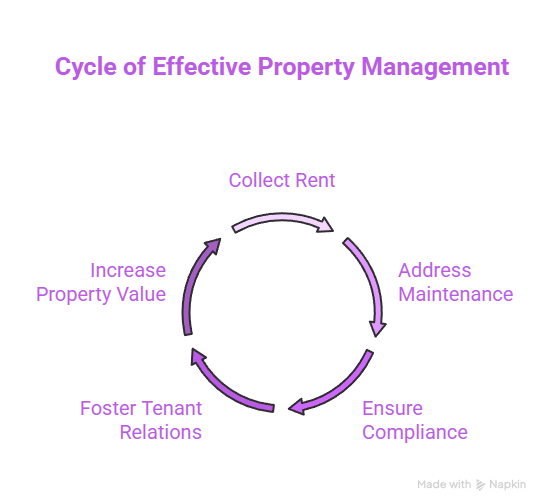
Property Managers: Roles and Responsibilities
Property managers are professionals or firms responsible for overseeing the daily operations, maintenance, and administration of residential, commercial, or industrial properties on behalf of owners. Their goal is to ensure properties remain valuable, functional, and profitable.
Key Responsibilities
- Tenant Relations
Build and maintain positive relationships with tenants, address concerns, and manage all aspects of their tenancy. - Leasing & Rent Management
Handle tenant applications, conduct screenings, collect rent, and enforce lease agreements. - Maintenance & Upkeep
Coordinate repairs, oversee regular maintenance, and ensure the property remains in top condition. - Financial Management
Prepare budgets, maintain financial records, and manage the property’s financial performance. This can also include advising owners on financial tools like a rental property loan when expanding or renovating the property. - Owner Representation
Act on behalf of the property owner to meet goals and ensure smooth, profitable operations.
Importance of Good Property Management
Good property management keeps properties well-maintained and tenants satisfied. This reduces turnover and boosts rental income. Effective managers can also help raise property values.
A skilled property manager builds trust with tenants by addressing their needs, making them feel valued. This trust leads to long-term relationships, benefiting everyone. Proactive steps like regular inspections and maintenance help prevent problems early. By creating a sense of community and keeping properties in top shape, managers encourage tenants to renew their leases, supporting a stable and profitable rental business.
Common Mistakes in Property Management
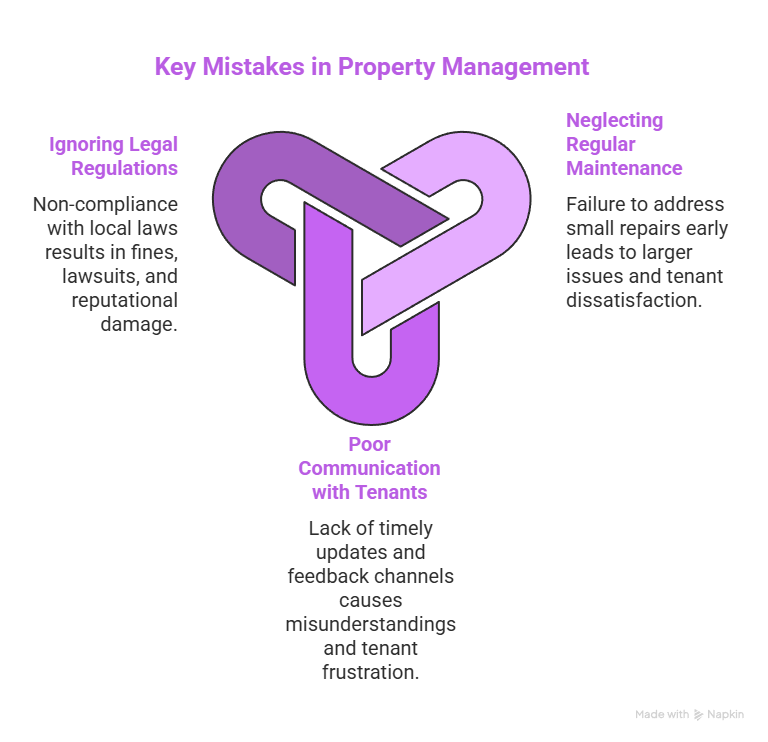
Neglecting Regular Property Maintenance
A big mistake is inadequate property maintenance. Taking care of small repairs early prevents them from becoming big, expensive issues. A well-maintained property feels welcoming and keeps tenants happy and wanting to stay longer. Tenants quickly notice when repairs drag on. If things aren’t fixed fast, they get frustrated. This can cause them to leave or leave bad reviews, making it harder to rent in the future.
Regular maintenance helps keep a property’s value high. Simple checks on plumbing, electrical, and HVAC systems catch problems early. This saves money and makes the home safer and more comfortable. When tenants see the property is cared for, they feel appreciated and want to stay longer.
Poor Communication with Tenants
Good communication is key in property management. Poor communication causes misunderstandings and unhappy tenants. When managers don’t keep tenants updated, issues can quickly grow worse. Timely updates on repairs, policy changes, or rent reminders improve tenant relations. Open feedback channels create a welcoming space, making tenants feel comfortable sharing their concerns.
Using technology can make communication easier. Many property managers now offer tenant portals for maintenance requests, online rent payments, and important documents. This builds a sense of community and gives tenants quick access to what they need. Regular emails or newsletters can also keep tenants updated on events and property improvements, improving their experience.
Ignoring Legal Regulations and Requirements
Every property manager must follow local laws. Ignoring rules can lead to expensive fines or lawsuits. These laws cover things like security deposits and evictions, and breaking them can damage a landlord’s reputation.
Staying informed about changes in legal requirements is essential. Ongoing training helps property managers stay up to date with the law. This knowledge not only keeps them safe from legal trouble but also protects both landlords and tenants.
Understanding fair housing laws is key. Discrimination can lead to serious penalties and hurt a property manager’s reputation. By treating all tenants fairly and fostering inclusivity, managers build trust in the community. Regularly reviewing leases to ensure they follow current laws helps prevent disputes, allowing managers to focus on creating a positive and thriving rental environment.
Trending Now
Property management can be complex and time-consuming, which is why many hire property management companies. However, not all companies are equal, and poor management can lead to legal trouble, tenant dissatisfaction, and financial losses. Red flags include poor communication, late rent payments, hidden fees, and failure to address maintenance issues promptly. Landlords should document issues to protect themselves and can report misconduct to local authorities or HUD. It’s crucial to choose a reliable property manager to avoid costly legal battles and ensure the success of your rental property.
An unprofessional property manager can harm your real estate investment with poor communication, bad tenant screening, unclear expenses, and frequent evictions. These issues with property management companies can lead to legal trouble, vacancies, and financial losses. To fix this, document problems, communicate with the manager, and, if necessary, file complaints or terminate the contract. Finding a reliable manager helps minimize risks and boost profits.
Financial Missteps in Property Management
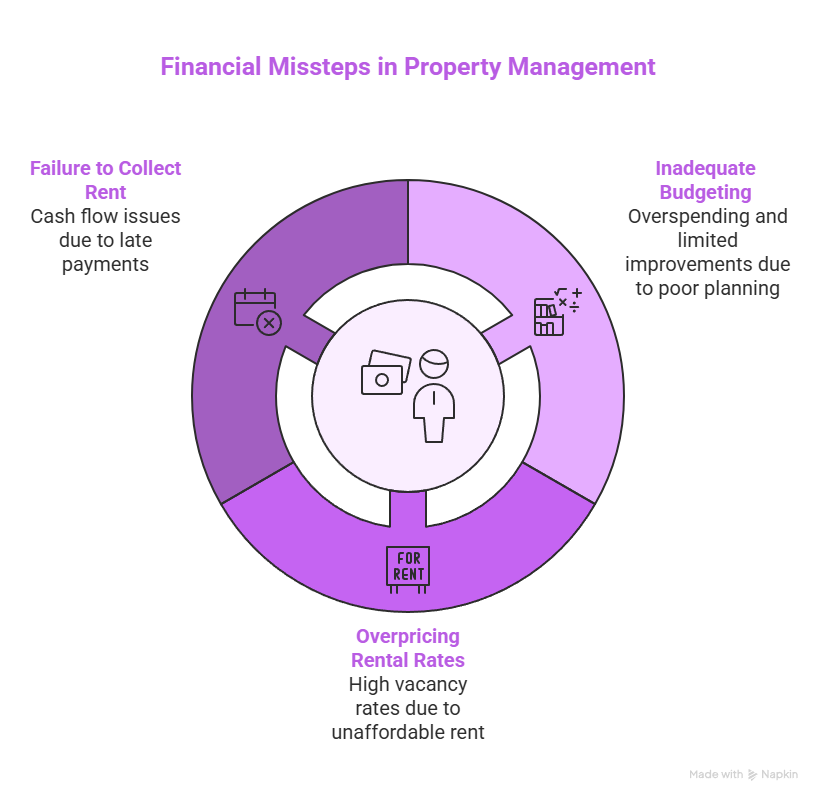
Inadequate Budgeting and Financial Planning
Good financial planning is crucial in property management. Without a budget, overspending can happen easily, draining resources and limiting future improvements. Staying on budget helps keep finances healthy and allows for continued growth.
A well-managed budget ensures improvements happen without straining finances. Property managers should review and adjust budgets regularly to catch issues early. Including a contingency fund helps cover unexpected costs like emergency repairs. Planning for potential financial challenges keeps the property on solid footing, allowing managers to stay proactive instead of reactive.
Overpricing Rental Rates
Setting rent too high is a common mistake. Overpricing drives away potential tenants. A fair, competitive rate attracts good tenants and reduces vacancy times.
Thorough market research helps set fair rental prices. Property managers should compare similar homes nearby and adjust based on demand. Unique features like upgrades or great locations can justify higher rents, but prices must still align with the market to avoid long vacancies.
Failure to Collect Rent on Time
Timely rent collection is key to keeping cash flow steady. Property managers must enforce payment deadlines, as delays can lead to financial strain on the property.
Strict late payment policies encourage tenants to pay on time. Offering multiple payment methods makes the process easier and boosts compliance. Clear communication, such as reminders, also improves rent collection. Regular updates and incentives for early payments create a cooperative relationship with tenants. Prioritizing efficient rent collection ensures a steady income, vital for successful property management.
Inefficient Tenant Management

Not Properly Screening Tenants
Thoroughly screening applicants is a key part of tenant management. Skipping this step can result in problematic tenants. Background checks, credit checks, and references help ensure the right people live on the property.
Cutting corners during tenant screening can lead to expensive evictions later. Investing time upfront saves money and effort long-term. Well-screened tenants are more likely to respect the property and honor their lease. Screening helps spot red flags like late payments or past evictions, avoiding future problems. A consistent screening process also ensures fairness, streamlines the application process, and helps build a positive reputation in the rental market.
Lack of Respect for Tenant Privacy
Respecting tenant privacy is essential. Property managers must maintain clear boundaries. Entering without notice can lead to tension and distrust, harming the relationship with tenants.
Property managers should always notify tenants before visits. Clear communication builds respect and trust. Honoring tenant privacy leads to greater satisfaction and loyalty. Many areas have strict laws on notice periods, so following these not only avoids legal trouble but also promotes transparency. Regular check-ins and open communication make tenants feel valued, creating a more harmonious living experience for all.
Overlooking the Importance of Marketing
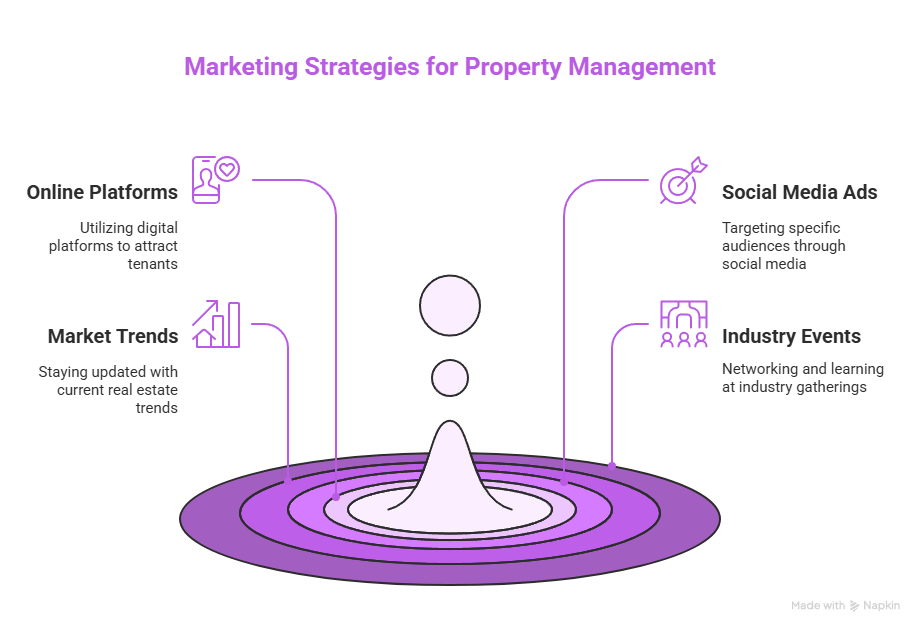
Inadequate Advertising of Properties
Effective advertising is key to attracting tenants. Poor marketing leads to longer vacancies. Property managers should use multiple strategies to reach potential renters and fill properties quickly.
Online platforms,social media, and local listings help attract tenants. Great photos and detailed descriptions help a property shine. Virtual tours and video walkthroughs let potential tenants explore from home, saving time and making the process easier. This convenience attracts more renters and helps fill vacancies quickly, meeting the needs of today’s busy tenants.
Targeted ads on social media help property managers reach the right audience. By analyzing engagement metrics, managers can refine their strategies, keeping their marketing effective and relevant to attract tenants.
Not Keeping Up with Market Trends
The real estate market changes quickly, so staying informed is key. Ignoring new trends can make properties feel outdated. Property managers should stay educated on current trends to boost tenant appeal.
Researching market trends helps property managers adjust pricing, marketing, and updates. Understanding what tenants want leads to smarter choices and keeps them around longer. More renters today want eco-friendly features and smart tech. Adding energy-efficient appliances or smart thermostats can draw in tenants who care about the environment. These upgrades also lower utility bills, making the home greener, cozier, and easier on the wallet.
Attending industry events gives property managers new ideas and keeps them updated on trends. Meeting others in the field lets them share stories, trade tips, and learn from each other. This can lead to fresh strategies that help properties stay competitive, which benefits both landlords and tenants.
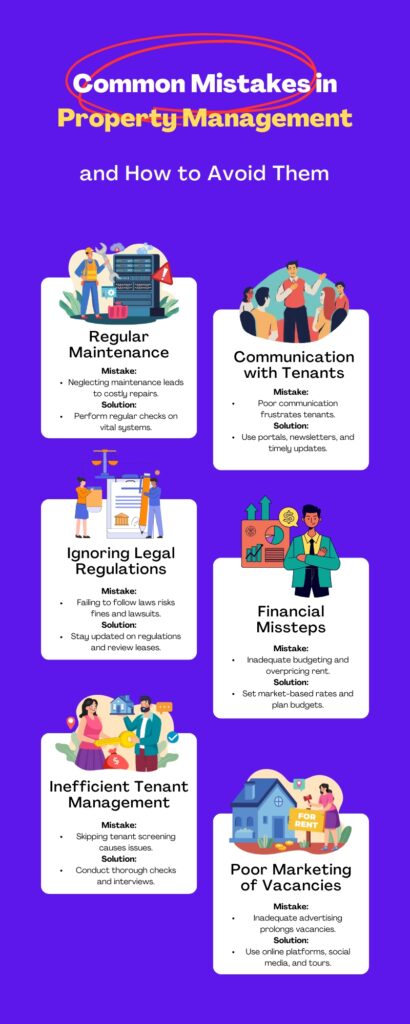
What are the most common property management issues landlords face?
Some of the most frequent property management issues include inadequate property maintenance, poor communication with tenants, and failure to follow legal regulations. These problems often lead to tenant dissatisfaction, costly repairs, and potential legal disputes.
How can I tell if I have an unprofessional property manager?
Signs of an unprofessional property manager include poor communication, hidden fees, delayed repairs, unclear financial reporting, and frequent tenant complaints. If your manager ignores your calls or fails to document maintenance requests, it may be time to reconsider your management contract.
What happens when property maintenance is inadequate?
Inadequate property maintenance leads to declining property value, frustrated tenants, and higher long-term repair costs. Addressing small issues early—like leaks or HVAC problems—helps avoid expensive repairs later and keeps tenants satisfied.
What should I do when my property manager ignores me?
If your property manager isn’t responding, start by documenting all communication attempts. Then, follow up in writing and outline your concerns. If the issue continues, you may file a complaint with local housing authorities or terminate the contract for breach of duty.
What’s the difference between a good vs. bad property manager?
A good property manager communicates openly, handles maintenance promptly, follows legal requirements, and manages finances responsibly. A bad manager neglects repairs, overcharges fees, or avoids accountability, which can lead to costly tenant turnover and reputation damage.
How can property managers avoid financial missteps?
Effective financial management requires setting realistic budgets, planning for contingencies, and reviewing expenses regularly. Avoid overpricing rents, which can lead to vacancies, and ensure rent collection policies are clear and consistent.
Why is tenant communication so important in property management?
Clear and consistent communication prevents misunderstandings and builds trust. Tools like tenant portals and regular updates help tenants feel valued and reduce frustration, especially during maintenance or policy changes.
What are the main problems with property management companies today?
Common problems include lack of transparency, poor maintenance response times, inadequate tenant screening, and outdated technology. Choosing a reputable company with a proven track record and positive reviews can prevent most of these issues.
How can outsourcing property management services help?
Outsourcing property management or back-office services to professionals can improve efficiency, reduce administrative burden, and ensure 24/7 tenant support. Reliable outsourcing services, like HelpSquad, provide virtual assistants who handle communication, scheduling, and tenant inquiries effectively.
What advice do you have for new property managers?
New property managers should focus on strong communication, proactive maintenance, understanding local laws, and maintaining accurate financial records. Building trust with both tenants and owners is the foundation of long-term success.
Conclusion
In conclusion, property managers should avoid these mistakes to ensure a smooth rental experience. By knowing their role, communicating well, and maintaining properties, they can support both landlords and tenants. Fixing these issues boosts property value and keeps tenants happy.
As a property manager, avoiding bad practices is key to success, but why settle for good when you can aim for exceptional? With HelpSquad Health, you get a team of virtual assistants and 24/7 customer service pros to manage your back-office tasks, tenant communication, and market research efficiently. Talk to us today and see how HelpSquad Health can transform your property management business.
Avoid Property Management Mistakes — Partner with HelpSquad
Our 24/7 live chat team helps you build better tenant relationships and streamline operations. Discover how HelpSquad can support your property management success.


